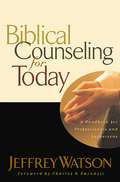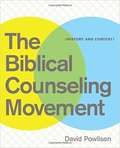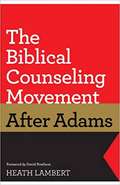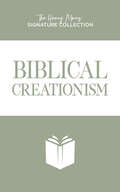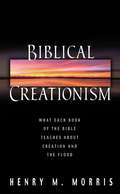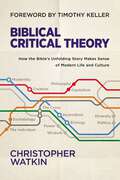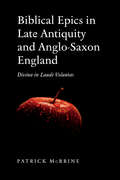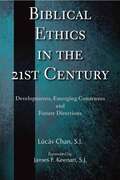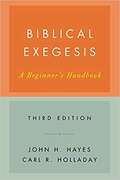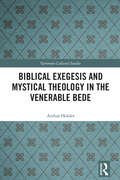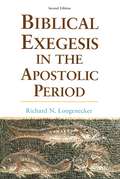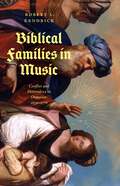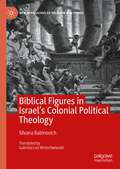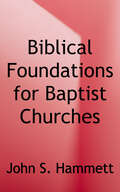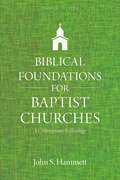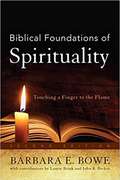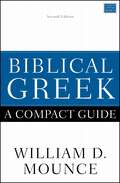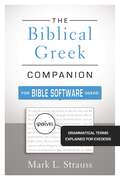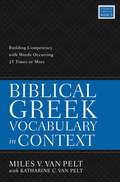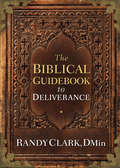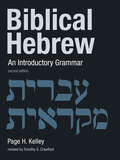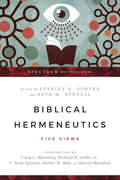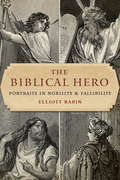- Table View
- List View
Biblical Counseling for Today (Swindoll Leadership Library)
by Jeffrey WatsonIn his preface to this challenging book Jeff Watson describes biblical counseling as "a noble adjective married to a nervous noun."Believers are wise to be skeptical of much that is done in the name of counseling in secular settings. Even under the umbrella of "Christian counseling," one has heard horror stories of cases where God's Word has been misused. But Jeff Watson makes a strong case in this volume for the legitimacy of marrying "biblical" and "counseling."Christian counselors, says Watson, need to cultivate three fundamental skills in their patients:How to tell their stories;How to choose their goals wisely; andHow to practice changes in their lives.Watson helps counselors achieve these goals by drawing on the interactions of Christ, the commands of Scripture, and the actions of the apostles and prophets. Thus he marries counseling and biblical principles.To those of us who are called on to counsel on any level, Charles Swindoll says, "This book will become an invaluable tool for you. I urge you to let it become your manual for proper counseling."
The Biblical Counseling Movement: History And Context
by David Arthur PowlisonBeginning in the late 1960s, a biblical counseling movement sought to reclaim counseling for the church and provide a Christian alternative to mainstream psychiatry and psychotherapy. The Biblical Counseling Movement: History and Context is an informative and thought-provoking account of that movement. This historical account combines careful scholarship with a unique, eyewitness insight. This book is an invaluable resource for those who want to understand the biblical counseling movement. The core chapters were originally a Ph.D. dissertation in history of science and medicine (University of Pennsylvania). This new edition adds a lengthy appendix, containing articles by Dr. Powlison that give an analysis of developments within the biblical counseling movement and in its relationship to evangelical psychotherapists.
The Biblical Counseling Movement after Adams
by Heath Lambert David PowlisonThose inside and outside of the biblical counseling movement recognize growing differences between the foundational work of Jay Adams and that of current thought leaders such as David Powlison. But, as any student or teacher of the discipline can attest, those differences have been ill-defined and largely anecdotal until now. <P><P> Heath Lambert, the first scholar to analyze the movement’s development from within, shows how refinements in framework, methodology, and engagement style are changing the face of the biblical counseling movement as we know it―producing a second generation of counselors who are increasingly competent to counsel. Find out how the biblical counseling movement has changed and improved and how the present-day leadership differs from the leadership of the past, in a respectful effort to evaluate and advance the efficacy of biblical counseling.
Biblical Creationism (The Henry Morris Signature Collection)
by Dr Henry MorrisTHE DOCTRINE OF CREATION DOESN’T REALLY MATTER…OR DOES IT? The history of creation is sprinkled all throughout Scripture, not just described in Genesis 1 and 2. The same goes for the Flood account in Genesis 6–9. But why does this matter? Dr. Morris shows that piecing together all these bits of scriptural information reveals how badly the secular world has misinterpreted the scientific evidence. The doctrine of creation is so foundational to the Christian worldview, and this book helps us understand why. This study strives to convince Christians everywhere that they must abandon all compromise theories of creation and return to the simple Genesis record of supernatural, six-day creation. Recognize that biblical authors accept creation and the Flood as true history Discover how Scripture supports a recent creation and a global Flood Examine the impossibility of evolution
Biblical Creationism
by Henry M. Morris IIICritics of the doctrine of creation often attempt to marginalize the great truths of God's creative acts. The reality, however, is that creation is mentioned in each of the Bible's 66 books. This is one of the great ignored truths of the modern Church. Far from being a trivial issue, or one that can be interpreted many different ways, God's record of creation displays a marvelous and clear consistency throughout. From the symphony of the creation week in Genesis, to the promise of a new heaven and a new earth in Revelation, the Bible speaks of a recent, six-day creation of the universe. A respected scholar, the late Dr. Henry M. Morris spent over six decades studying God's Word, and his commentaries enriched the faith of many. In this remarkable book, Dr. Morris examines both the famous creation account in Genesis, as well as lesser-known references, such as Ezra and Colossians. Biblical Creationismis a devastating response to the Bible's critics.
Biblical Critical Theory: How the Bible's Unfolding Story Makes Sense of Modern Life and Culture
by Christopher WatkinA bold vision for Christians who want to engage the world in a way that is biblically faithful and culturally sensitive.In Biblical Critical Theory, Christopher Watkin shows how the Bible and its unfolding story help us make sense of modern life and culture.Critical theories exist to critique what we think we know about reality and the social, political, and cultural structures in which we live. In doing so, they make visible the values and beliefs of a culture in order to scrutinize and change them.Biblical Critical Theory exposes and evaluates the often-hidden assumptions and concepts that shape late-modern society, examining them through the lens of the biblical story running from Genesis to Revelation, and asking urgent questions like:How does the Bible's storyline help us understand our society, our culture, and ourselves?How do specific doctrines help us engage thoughtfully in the philosophical, political, and social questions of our day?How can we analyze and critique culture and its alternative critical theories through Scripture? Informed by the biblical-theological structure of Saint Augustine's magisterial work The City of God (and with extensive diagrams and practical tools), Biblical Critical Theory shows how the patterns of the Bible's storyline can provide incisive, fresh, and nuanced ways of intervening in today's debates on everything from science, the arts, and politics to dignity, multiculturalism, and equality. You'll learn the moves to make and the tools to use in analyzing and engaging with all sorts of cultural artifacts and events in a way that is both biblically faithful and culturally relevant.It is not enough for Christians to explain the Bible to the culture or cultures in which we live. We must also explain the culture in which we live within the framework and categories of the Bible, revealing how the whole of the Bible sheds light on the whole of life.If Christians want to speak with a fresh, engaging, and dynamic voice in the marketplace of ideas today, we need to mine the unique treasures of the distinctive biblical storyline.
Biblical Criticism in Early Modern Europe: Erasmus, the Johannine Comma and Trinitarian Debate.
by Mcdonald Grantley RobertMedieval western theologians considered the Johannine comma (1 John 5:7-8) the clearest biblical evidence for the Trinity. When Erasmus failed to find the comma in the Greek manuscripts he used for his New Testament edition, he omitted it. Accused of promoting Antitrinitarian heresy, Erasmus included the comma in his third edition (1522) after seeing it in a Greek codex from England, even though he suspected the manuscript's authenticity. The resulting disputes, involving leading theologians, philologists and controversialists such as Luther, Calvin, Sozzini, Milton, Newton, Bentley, Gibbon and Porson, touched not simply on philological questions, but also on matters of doctrine, morality, social order, and toleration. While the spuriousness of the Johannine comma was established by 1900, it has again assumed iconic status in recent attempts to defend biblical inerrancy amongst the Christian Right. A social history of the Johannine comma thus provides significant insights into the recent culture wars. Gives the first detailed account of the debate over the textual basis for the doctrine of the Trinity, from the sixteenth to the twentieth century Shows how biblical philology was not simply the preserve of scholars, but was a subject of broad social interest in the early modern period, with serious political implications Provides rich philological detail in an accessible style
Biblical Epics in Late Antiquity and Anglo-Saxon England: Divina in Laude Voluntas
by Patrick McbrineBiblical poetry, written between the fourth and eleventh centuries, is an eclectic body of literature that disseminated popular knowledge of the Bible across Europe. Composed mainly in Latin and subsequently in Old English, biblical versification has much to tell us about the interpretations, genre preferences, reading habits, and pedagogical aims of medieval Christian readers. Biblical Epics in Late Antiquity and Anglo-Saxon England provides an accessible introduction to biblical epic poetry. Patrick McBrine’s erudite analysis of the writings of Juvencus, Cyprianus, Arator, Bede, Alcuin, and more reveals the development of a hybridized genre of writing that informed and delighted its Christian audiences to such an extent it was copied and promoted for the better part of a millennium. The volume contains many first-time readings and discussions of poems and passages which have long lain dormant and offers new evidence for the reception of the Bible in late Antiquity and the Middle Ages.
Biblical Ethics In The 21st Century: Developments, Emerging Consensus, And Future Directions
by Lúcás ChanReviews and critiques the major attempts at biblical ethics over the past twenty years by both biblical theologians and theological ethicists, focusing on New Testament ethics as an illustration.
Biblical Exegesis: A Beginner's Handbook
by John H. Hayes Carl R. HolladayJohn Hayes and Carl Holladay have thoroughly revised and expanded this best-selling textbook, adding new chapters on emerging methods of interpretation and the use of computer technology for exegesis. All bibliographies have been updated, and Scripture has been converted to the NRSV. This new edition retains the features of the early editions: a minimum of technical terms, solid introductory guidelines in exegetical methods, and a valuable presentation of exegetical theory and practice. It is ideal for general introductory exegesis courses, introductions to the Old and New Testaments, and introduction to preaching, as well as for pastors and lay leaders.
Biblical Exegesis and Mystical Theology in the Venerable Bede (Variorum Collected Studies)
by Arthur HolderBiblical Exegesis and Mystical Theology in the Venerable Bede brings together 17 essays by Arthur Holder exploring the theology and spirituality found in Bede’s biblical commentaries and homilies. The volume shows that Bede was both a masterful student of received tradition and a creative thinker concerned to address the needs and interests of his audience of Christian pastors and teachers in the eighth-century Northumbrian church.Although Bede is best known as the author of The Ecclesiastical History of the English People, the last half-century of scholarship has demonstrated the sophistication and vast influence of his work in the fields of grammar, biblical interpretation, hagiography, poetry, computus, natural science, and theology. The chapters in this volume show how Bede’s exegesis was integrally connected with his work in all those genres and with the monumental artistic productions of his monastery such as the illuminated bible manuscript known as the Codex Amiatinus. The five parts of the book deal with Bede as teacher and biblical scholar, his interpretations of the tabernacle and the temple, his commentary on the Song of Songs, his attitudes toward philosophy and heresy, and his mystical theology.This book will be of interest to students of Christian theology, mysticism, the development of biblical interpretation, and the history of early medieval England.
Biblical Exegesis in the Apostolic Period
by Richard N. LongeneckerThe discovery of the Dead Sea Scrolls, the Nag Hammadi texts, and new Targums has greatly increased scholarly interest in the relationship between the New Testament and first -century Judaism. This critically acclaimed study by Richard Longenecker sheds light on this relationship by exploring the methods the earliest Christians used to interpret the Old Testament. By comparing the first Christian writings with Jewish documents from the same period, Longenecker helps to discern both the key differences between Christianity and Judaism and the Judaic roots of the Christian faith. This revised edition of Biblical Exegesis in the Apostolic Period brings Longenecker's valued work up to date with current research in this important field of study.
Biblical Families in Music: Conflict and Heterodoxy in Oratorios, 1670–1770
by Robert L. KendrickExamines how stories of biblical families were reconfigured and projected in the genre of the oratorio, a form of sacred opera, in the seventeenth and eighteenth centuries. Based to a great extent on the Old Testament, the largely Catholic musical-dramatic genre was popular in Italy, Austria, and southern Germany in the seventeenth and eighteenth centuries. Biblical Families in Music reveals how difficult stories of fratricide, child sacrifice, death, and forbidden love performed a didactic function in oratorios, teaching early modern audiences about piety and the rules of proper family life. In the century after 1670, the heavily adapted tales of Abraham and Isaac, Cain and Abel, and the Egyptian slave Hagar and her son Ishmael were set to music by figures such as Alessandro Scarlatti and Antonio Sacchini and performed during Lent in churches and other sacred spaces for an audience of court nobility, clergy, and the urban patriciate. By examining the resonance of Catholic oratorios within predominantly upper-class social realities, the book broadens our cultural understanding of the early modern European family and underscores the centrality of family and familial relation to social position, devotional taste, and identity.
Biblical Figures in Israel's Colonial Political Theology (New Approaches to Religion and Power)
by Silvana RabinovichThis book reveals and counteracts the misuse of biblical texts and figures in political theology, in an attempt to decolonialize the reading of the Old Testament. In the framework of Critical Theory, the book questions readings that inform the State of Israel's military apparatus. It embraces Martin Buber’s pacifist vision and Edward Said’s perspective on Orientalism, influenced by critical authors such as Amnon Raz Krakotzkin, Ilan Pappé, Shlomo Sand, Idith Zertal, and Enrique Dussel’s.
Biblical Foundations for Baptist Churches: A Contemporary Ecclesiology
by John S. HammettIn this book, professor and former pastor John Hammett helps church leaders think through foundational questions about the nature of the church. Blending biblical teaching and practical ministry experience, Hammett presents a comprehensive ecclesiology from a historic Baptist perspective, examining crucial contemporary
Biblical Foundations For Baptist Churches: A Contemporary Ecclesiology
by John S. HammettAn updated examination of ecclesiology from a Baptist perspective In this useful book, professor and former pastor John Hammett helps church leaders think through foundational questions about the nature of the church. Blending biblical teaching and practical ministry experience, Hammett presents a comprehensive ecclesiology from a historic Baptist perspective, examining crucial contemporary issues such as church discipline, the role of elders, and church ministry in a post-Christian culture. This second edition contains updates throughout, including: Substantive changes to chapters on the nature of the church, Baptist church polity, and deacons An expanded chapter on baptism and the Lord’s Supper A thoroughly revised chapter on church models like multisite churches and missional churches A brand-new chapter on meaningful church membership
Biblical Foundations For Worship
by Vernon WhaleyWelcome to WRSP 510 Biblical Foundations for Worship. This course presents principles of Old and New Testament worship. A study comparing God's revelation to man is made to man's response to God. Biblical studies include, but are not limited to: The Old Testament- the Pentateuch, Books of History, Books of Wisdom and Poetry, and the Prophets. The New Testament - Worship as taught by Jesus; Worship given to Jesus; Worship in the Early Church; Christology of Worship; and, Worship in Eternity. Included are principles for worship and brief discussions of pre-tabernacle, tabernacle, temple, and synagogue worship. Students engage in semester projects that include the study of worship practices by select Biblical personalities.
Biblical Foundations Of Spirituality: Touching A Finger To The Flame
by Barbara E. Bowe John R. Barker Laurie BrinkBiblical Foundations of Spirituality invites readers to “touch a finger to the flame” of the Bible by offering guidance on what, how, and why to read Scripture as a source of spiritual nourishment. The second edition builds on Barbara Bowe’s acclaimed book with two new chapters by Laurie Brink and John R. Barker introducing key theological concepts and exploring how biblical spirituality was first experienced and expressed in early Christian communities. The book begins by exploring the many meanings of the word “spirituality,” then leads readers through the Bible—from Genesis to Revelation—to develop a biblically based spirituality that can serve as a compass in the challenges of life. Updated to reference the latest scholarship, this book helps make the Bible more accessible and shows how it can be relevant to life today. The book stresses the spiritual dimension of biblical figures’ search for God and shows how their insights about God—from successes to dead ends—can reflect our contemporary searching and struggles. Biblical Foundations of Spirituality reveals the spiritual wisdom of the Bible, connecting it with everyday life and spirituality. With a chronology, reflection questions, a glossary, and updated notes and bibliography, as well as two new chapters, the second edition of Biblical Foundations of Spirituality is ideal for classroom, parish, or individual reading.
Biblical Greek: Second Edition
by William D. MounceBiblical Greek: A Compact Guide, Second Edition by William D. Mounce is a handy, at-a-glance reference for students, pastors, and teachers. It follows the organization and format of the fourth edition of Basics of Biblical Greek Grammar, but it is also usable by students who learned with a different grammar. By limiting its discussion to the "nuts and bolts," Greek language students working on translation and exegesis will more quickly and easily find the relevant grammatical refreshers. Students can, for example, check on the range of meaning for a particular word or make sure they remember how aorist participles function in a sentence. The paradigms, word lists, and basic discussions in Biblical Greek: A Compact Guide Second Edition points students in the right direction and allow them to focus on more advanced Greek study.
The Biblical Greek Companion for Bible Software Users: Grammatical Terms Explained for Exegesis
by Mark L. StraussThe Biblical Greek Companion for Bible Software Users helps users understand the exegetical significance of Greek grammatical terminology identified by the program. This resource provides students who utilize biblical language software the insight they need to make sense of the data provided by the program, giving them deeper insight into the biblical text that they could not get by solely reading an English translation. The Biblical Greek Companion for Bible Software Users is ideally suited for: Pastors and ministry leaders who may have learned Greek at one time but have experienced the loss of much of that learning College and seminary students who are learning Greek and need a guide to help understand the significance of the grammatical terminology Bible software users who never formally learned Greek in the classroom and need help understanding the meaning of the terms they encounter With grammatical terms laid out and discussed in an intuitive and user-friendly format, readers can now spend time focusing on exegesis and applying their findings to their preaching, teachings, study, and writing instead of puzzling over the significance of grammatical terminology and how to apply it.
Biblical Greek Vocabulary in Context: Building Competency with Words Occurring 25 Times or More
by Miles V. Van PeltBiblical Greek Vocabulary in Context by Miles V. Van Pelt is designed to reinforce a student's basic Greek vocabulary by presenting words that occur twenty-five times or more in the context of the Greek New Testament.Miles Van Pelt collates all 513 of these Greek words into approximately 200 key biblical verses and/or verse fragments to help students practice reading them in their literary context and thus improve their Greek vocabulary retention. Rather than rote memorization, Van Pelt's approach teaches word meaning through each word's naturally occurring context--the way people naturally learn languages.The book includes two primary sections:The first section provides room for students to write their own glosses of the biblical verse and to parse as they feel necessary. An English translation is also provided, and any term that appears less than twenty-five times is glossed. Proper names are identified with gray text.The second section of the book provides the same biblical verses from the first section but with minimal room to write glosses and parse and without an English translation for aid. The end of the book includes a Greek-English lexicon of all the words occurring twenty-five times or more in the Greek New Testament.
The Biblical Guidebook to Deliverance
by Randy ClarkACCESS GOD'S SUPERNATURAL POWER AND AUTHORITY TO DEFEAT THE DEVILMany people are unconsciously living in bondage. Marriages arefailing, drugs are rampant, pornography is everywhere, and evenChristians have given up—on God, the church, and themselves.The Biblical Guidebook to Deliverance provides you with thesupernatural power and authority to fight your battles and be freefrom oppression. Full of scriptural, yet practical, teaching this bookwill help you learn how deliverance was part of Jesus&’s ministry inthe New Testament, and how you have access to the same power—enabling you to live free from the chains of sin. No matter what situation you are going through, God will giveyou His grace so that you can rejoice in freedom and live in thefullness of life that He intends for you.
Biblical Hebrew: An Introductory Grammar
by Page H. KelleyA standard, much-used textbook updated and improved Comprehensive in scope, this carefully crafted introductory grammar of Biblical Hebrew offers easy-to-understand explanations, numerous biblical illustrations, and a wide range of imaginative, biblically based exercises. The book consists of thirty-one lessons, each presenting grammatical concepts with examples and numerous exercises judiciously selected from the biblical text. These lessons are accompanied by eleven complete verb charts, an extensive vocabulary list, a glossary of grammatical terms, and a subject index. In this second edition Timothy Crawford has updated the text throughout while preserving the Page Kelley approach that has made Biblical Hebrew so popular over the years.
Biblical Hermeneutics: Five Views (Spectrum Multiview Book Series)
by Stanley E. Porter Jr. Beth M. StovellFive experts in biblical hermeneutics gather here to state and defend their approach to the discipline. Contributors include: Craig Blomberg with the historical-critical/grammatical approach, Richard Gaffin with the redemptive-historical approach, Scott Spencer with the literary/postmodern approach, Robert Wall with the canonical approach and Merold Westphal with the philosophical/theological approach.
The Biblical Hero: Portraits in Nobility and Fallibility
by Elliott RabinApproaching the Bible in an original way—comparing biblical heroes to heroes in world literature—Elliott Rabin addresses a core biblical question: What is the Bible telling us about what it means to be a hero? Focusing on the lives of six major biblical characters—Moses, Samson, David, Esther, Abraham, and Jacob—Rabin examines their resemblance to hero types found in (and perhaps drawn from) other literatures and analyzes why the Bible depicts its heroes less gloriously than do the texts of other cultures: * Moses founds the nation of Israel—and is short-tempered and weak-armed. * Samson, arrogant and unhinged, can kill a thousand enemies with his bare hands. * David establishes a centralized, unified, triumphal government—through pretense and self-deception. * Esther saves her people but marries a murderous, misogynist king. * Abraham's relationships are wracked with tension. * Jacob fathers twelve tribes—and wins his inheritance through deceit. In the end, is God the real hero? Or is God too removed from human constraints to even be called a &“hero&”? Ultimately, Rabin excavates how the Bible&’s unique perspective on heroism can address our own deep-seated need for human-scale heroes.
